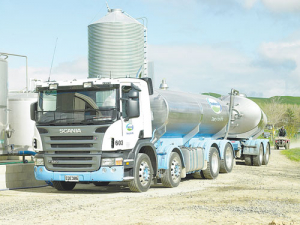Another Windfall for Fonterra Farmers, Unit Holders
Fonterra farmer shareholders and unit holders are in line for another payment in April.
 Northland regional Federated Farmers dairy chair Matt Long says a record milk price this season would be a huge psychological boost for local dairy farmers.
Northland regional Federated Farmers dairy chair Matt Long says a record milk price this season would be a huge psychological boost for local dairy farmers.
A record milk price this season would be a huge psychological boost for Northland farmers, says the region's Federated Farmers dairy chair Matt Long.
He expects farmers to use the extra income to reduce debt and improve the environmental footprints of their business.
"I also expectsome to spend on productivity improvements and some well-earned spending on things to improve their lifestyle," Long told Rural News.
"The forecast payout is very positive, but necessary given soaring inflation of input costs."
Long points out that soaring costs and worker shortages remain the biggest challenges facing local farmers, who endured a severe drought in the previous two seasons.
Fonterra's latest milk price forecast for the season is in the range of $8.90 to $9.50/kgMS, with a mid-point of $9.20/kgMS.
For Northland, based on milk production of around 81 million kgMS at $9.20 payout would pump nearly $750 million into the region's economy.
BNZ economist Doug Steel notes that dairy prices have started the New Year in fine form, pushing higher from the already elevated levels reached in 2021.
"Prices are 28% above a year ago, nearly 38% higher than their 5-year average, and at their highest level since 2014," notes Steel.
An expected 4% drop in NZ milk production is one of the factors keeping the milk price at record levels.
"While there is some rain in the near-term forecast, we expect NZ milk production to remain below last year's strong late season outcomes over coming months such that the full season will be down in the order of 4% or more," he says. Milk production in key overseas markets - the US and Europe - is also spluttering. Tighter supply is also pushing prices up.
But Steel says there are some downward risks as well - China's growth could be slower than anticipated and Omicron is still looming large around the globe.
But for now, at least, milk price prospects are strong.
"For farmers facing such things as variable weather, higher costs, rising interest rates, proposed options to price agricultural emissions, an exceptionally tight labour market, and the possibility of significant disruption from Omicron circulating in the community - it is good to take one thing off the worry list."
Having been hit by a severe drought over the previous two seasons, Northland's milk production is tracking well.
Long says Northland's climate is highly variable.
"I think after a difficult start to the season most farms will be having at least average production," he says.
However, like most other growers, they are also facing soaring input costs.
On his farm at Matapouri, eastern Whangarei Long milks 200 cows and hopes to supply 65,000 kgMS this season.
"We are rebuilding after two years of quite intense drought," he says.
Global trade has been thrown into another bout of uncertainty following the overnight ruling by US Supreme Court, striking down President Donald Trump's decision to impose additional tariffs on trading partners.
Controls on the movement of fruit and vegetables in the Auckland suburb of Mt Roskill have been lifted.
Fonterra farmer shareholders and unit holders are in line for another payment in April.
Farmers are being encouraged to take a closer look at the refrigerants running inside their on-farm systems, as international and domestic pressure continues to build on high global warming potential (GWP) 400-series refrigerants.
As expected, Fonterra has lifted its 2025-26 forecast farmgate milk price mid-point to $9.50/kgMS.
Bovonic says a return on investment study has found its automated mastitis detection technology, QuadSense, is delivering financial, labour, and animal-health benefits on New Zealand dairy farms worth an estimated $29,547 per season.

OPINION: Here w go: the election date is set for November 7 and the politicians are out of the gate…
OPINION: ECan data was released a few days ago showing Canterbury farmers have made “giant strides on environmental performance”.